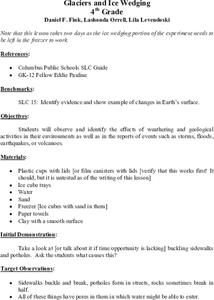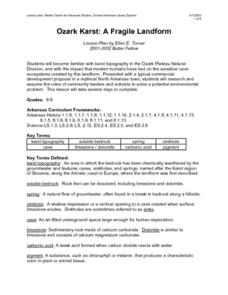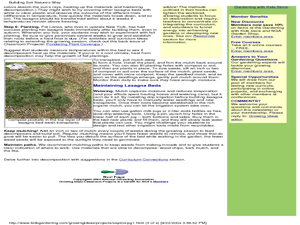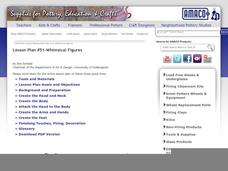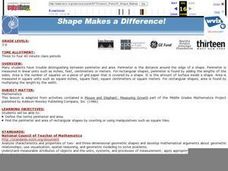Curated OER
Glaciers and Ice Wedging
Fourth graders observe and identify a variety of weathering and geological activities in the area in which they live. This focuses primarily on what happened during the Ice Age, and how, even today, glaciers are shaping and re-shaping...
Teach Engineering
Manned Mission to Mars
To go or to not to go — the question for a mission to Mars. This resource provides details for a possible manned mission to Mars. Details include a launch schedule, what life would be like on the surface, and how the astronauts would...
National Gallery of Canada
Self-Portrait, Mirrors and Metamorphosis!
Using M.C. Escher's Hand with Reflecting Sphere as inspiration, learners create their own set of self-portraits using various reflective surfaces. The lesson plan begins with a discussion about portraiture and ends with a presentation of...
Teach Engineering
Off-Road Wheelchair Challenge
Challenge your class to use their understanding of the engineering design process to design and build a small-scale, off-road prototype for an assistive technology device. Teams select materials to build their scale models, and, using...
NOAA
Ocean Zones
How can organisms light up in water? Bioluminescence is light produced in a chemical reaction that can occur in an organism's body. First, learners determine what happens to light/color as you move into the deep ocean. In groups, they...
National Nanotechnology Infrastructure Network
Small Scale Sculpting: Etch Lab
Make works of art using a vintage yet effective etching strategy. The surface of a semiconductor chip has specific patterns formed through a process called etching. Through a lab investigation, young scholars recreate that process...
Curated OER
Kosovo: A Thousand Year Old Border Conflict
Students present proposals and negotiate with other representatives to bring lasting peace to the area through a simulated "Summit Conference."
Curated OER
Ozark Karst: A Fragile Landform
Young geologists become familiar with the Karst Topography in the Ozark Mountains. They study how human activity has affected the cave ecosystem. They conduct a simulation in which a large development is proposed in the area, and they...
Curated OER
Introduction to Flight: A Math, Science and Technology Integrated Project
Seventh graders review graphing procedures and practice locating points using x,y coordinates. Students calculate the areas of the top and bottom surfaces of the airfoil. They construct a test model of the airfoil.
Florida Center for Reading Research
Phonics: Letter Recognition, Venn Diagram Letter Name Sort
What’s in a name? Letters, of course! Partners place the letters of their names on a Venn diagram. Letters they have in common are named and placed in the overlapping area of the circles, while letters unique to just one of the names are...
Polar Bears International
Top of the World
Learn about polar bears and the Arctic circle with a lesson about the countries and conditions of the region. After examining how the area differs from Antarctica, kids explore climates, animals, and geographical position...
Teach Engineering
Take Off with Paper Airplanes
Let's go fly a kite ... oops, a paper airplane! The 13th segment in an aviation unit of 22 relates the parts of an airplane to paper airplanes. Pupils learn the functions of the control surfaces of a plane to really make their knowledge...
Curated OER
Building Soil Nature's Way: Exploring decomposition and soil health
Students explore decomposition and soil health by creating their own garden. In this agriculture lesson, students build a "lasagna garden" with organic matter found in the area and plant perennials native to their region....
AMCO
Whimsical Figures
Clay is a wonderful and expressive medium for learners of any age. Kids get creative as they make whimsical figures out of clay. A hyperlinked materials list, images of each step in the process, and helpful tips makes this a great art...
SEN Teacher
Nets (3D Models)
Let your learners pick and create a fun shape from this custom template. Shapes range from complex geometric figures to the more common cube and prism. Each page can be labeled with your personal directions. Additional printable listed...
University of Wisconsin
Noting Notable Features for Rain Gardens
Eight groups in your class are each responsible for a different aspect of surveying the campus for a suitable rain garden location. Features to consider include water flow, topography, sun/shade patterns, land surface, vegetation,...
Curated OER
Observation and Inference
Assess your young scientists' understanding of the difference between observation and inference with this 20-question multiple choice quiz. It reviews a variety of physics and astronomy concepts, such as solar eclipses and sunspots, the...
Open Oregon Educational Resources
Manufacturing Processes 4-5
No need to manufacture an excuse for learning about manufacturing. Scholar use an eBook to study manufacturing processes. The textbook covers milling machines, lathe machines, drill presses, bandsaws, surface grinders, heat treating,...
Exploratorium
Viral Packaging
Create a protective protein shell as a package. Using the included template, pupils tape together 20 triangles to create a 20-sided shape to represent the protective shell of a virus. The model of the protein shell incases the nucleic...
Curated OER
Area of Solids
Students find the area of rectangular solids and cylinders by cutting them into flat pieces and adding the areas.
Curated OER
Does Contact Area Matter?
Learners work together to design and implement an experiment on friction. They test to see if contact area affects the amount of friction. They discover how engineers use friction to make certain products better.
Curated OER
Prints and Outlines
Students determine the area of two objects by superimposing one on the other. They compare and order the area of different shapes by covering a larger shape with similar smaller ones. They complete these activities as different stations.
Curated OER
Area of Parallelograms
Seventh graders review the process of finding the area of a rectangle and complete a couple of examples as a class. They discuss what a parallelogram is and what the formula would be for finding its area. They listen to an explanation...
Curated OER
Shape Makes a Difference!
Young scholars learn the difference between perimeter and area by watching a video and a hands on activity.
Other popular searches
- Surface Area and Volume
- Surface Area and Net
- Cylinder Surface Area
- Surface Area of Prisms
- Surface Area Volume
- Surface Area of Cylinders
- Finding Surface Area
- Surface Area Cone
- Surface Area Volume Cylinder
- Surface Area Lesson
- Cylinder Surface Area Nets
- Lateral Surface Area


